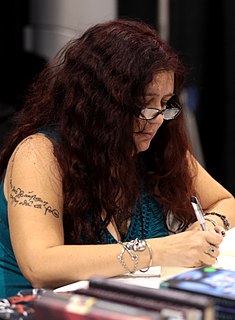A Quote by Audrey Niffenegger
Even her name seemed empty, as though it had detached itself from her and was floating untethered in his mind. How am I supposed to live without you? It was not a matter of the body; his body would carry on as usual. The problem was located in the word how: he would live, but without Elspeth the flavour, the manner, the method of living were lost to him. He would have to relearn solitude.
Related Quotes
If he looked into her face, he would see those haunted, loving eyes. The hauntedness would irritate him - the love would move him to fury. How dare she love him? Hadn't she any sense at all? What was he supposed to do about that? Return it? How? What could his calloused hands produce to make her smile? What of his knowledge of the world and of life could be useful to her? What could his heavy arms and befuddled brain accomplish that would earn him his own respect, that would in turn allow him to accept her love?
She expected the pain, when it came. But she gasped at its sharpness; it was not like any pain she had felt before. He kissed her and slowed and would have stopped. But she laughed, and said that this one time she would consent to hurt, and bleed, at his touch. He smiled into her neck and kissed her again and she moved with him through the pain. The pain became a warmth that grew. Grew, and stopped her breath. And took her breath and her pain and her mind away from her body, so that there was nothing but her body and his body and the light and fire they made together.
He wanted to hear her concerns and alleviate them, he wanted to hold her and kiss her and convince her that he would find a way to make their relationship work, no matter how hard that might be. He wanted to to make her hear his words: that he couldn't imagine a lofe without her,that his feelings for her were real. But most of all, he wanted to reassure himself that she felt the same way about him.
She saw him the first day on board, and then her heart sank into her shoes as she realized at last how much she wanted him. No matter what his past was, no matter what he had done. Which was not to say that she would ever let him know, but only that he moved her chemically more than anyone she had ever met, that all other men seemed pale beside him.
She opened her mouth to answer, but he was already kissing her. She had kissed him so many times—soft gentle kisses, hard and desperate ones, brief brushes of the lips that said good-bye, and kisses that seemed to go on for hours—and this was no different. The way the memory of someone who had once lived in a house might linger even after they were gone, like a sort of psychic imprint, her body remembered Jace. Remembered the way he tasted, the slant of his mouth over hers, his scars under her fingers, the shape of his body under her hands.
If she took Po as her husband, she would be making promises about a future she couldn't yet see. For once she became his wife, she would be his forever. And, no matter how much freedom Po gave her, she would always know that it was a gift. Her freedom would be not be her own; it would be Po's to give or to withhold. That he never would withhold it made no difference. If it did not come from her, it was not really hers.
Once upon a time you were a fish. How do you know? Because I was also a fish. You, too? Sure. A long time ago. Anyway, being a fish, you knew how to swim. You were a great swimmer. A champion swimmer, you were. You loved the water. Why? What do you mean, why? Why did I love the water? Because it was your life! And as we talked, I would have let him go one finger at a time, until, without his realizing, he'd be floating without me. Perhaps that is what it means to be a father-to teach your child to live without you.
As though she had entered a fable, as though she were no more than words crawling along a dry page, or as though she were becoming that page itself, that surface on which her story would be written and across which there blew a hot and merciless wind, turning her body to papyrus, her skin to parchment, her soul to paper.
Brigan was saying her name, and he was sending her a feeling. It was courage and strength, and something else too, as if he were standing with her, as if he'd taken her within himself, letting her rest her entire body for a moment on his backbone, her mind in his mind, her heart in the fire of his. The fire of Brigan's heart was astounding. Fire understood, and almost could not believe, that the feeling he was sending her was love.



































